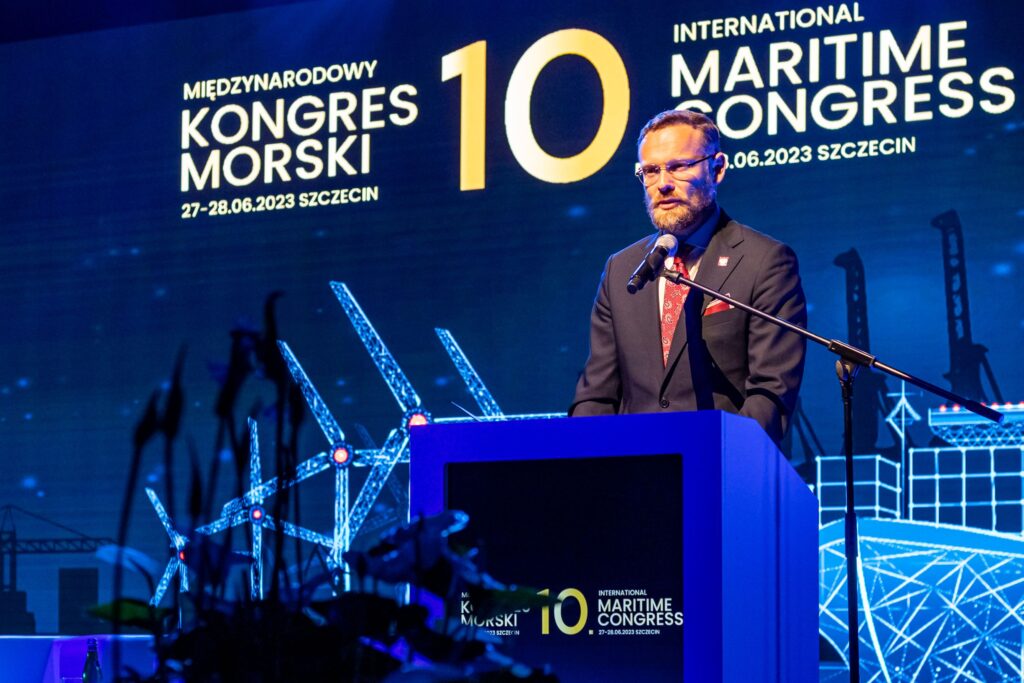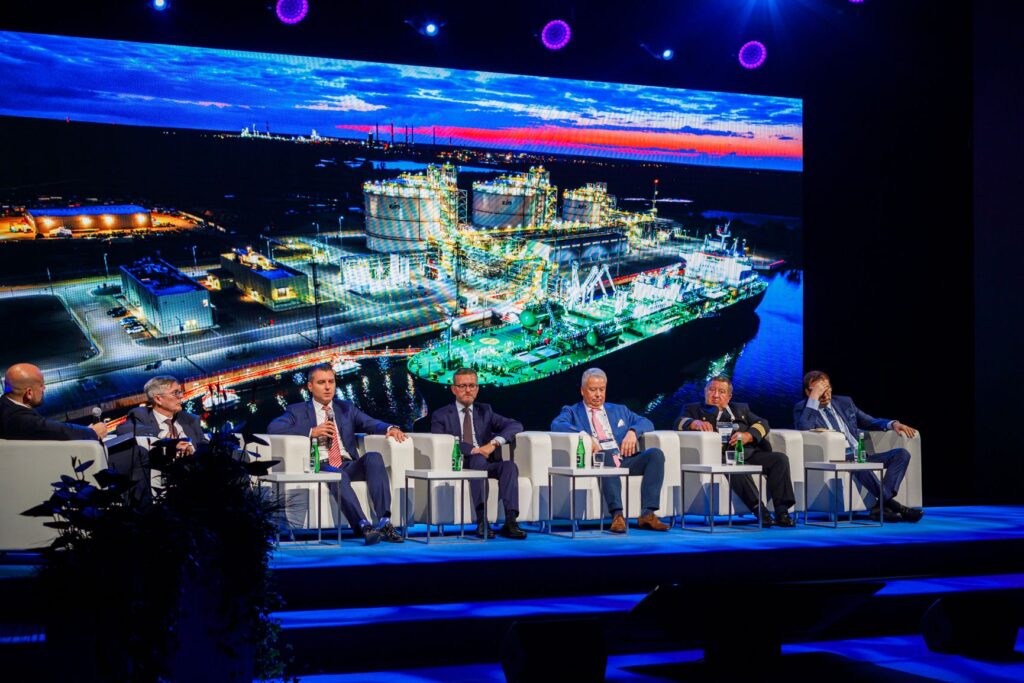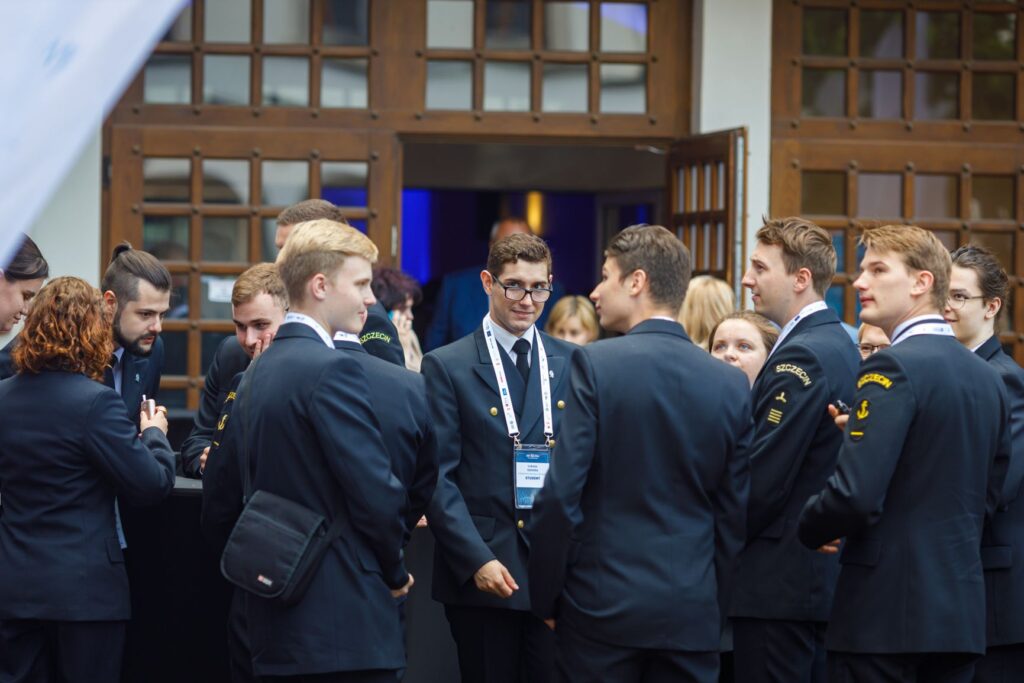For two days, 27-28.06.2023, maritime industry specialists discussed the problems and opportunities facing the maritime economy at the 10th International Maritime Congress in Szczecin. This year's anniversary meeting was a great opportunity to summarize the past decade, not only the achievements and intentions that have been achieved over the past ten years, but also the challenges facing the maritime industry that will have to be met.
In a letter to the congress participants, read by West Pomeranian Governor Zbigniew Bogucki, Prime Minister Mateusz Morawiecki wrote: "The jubilee edition of the congress is proof that it is a lasting and eagerly awaited event for the maritime industry. I am convinced that the deliberations, debates and panel discussions will bring ideas and concepts that will give new momentum to the development of the maritime industry."
The message to the participants of the meeting was also sent by the Speaker of the Polish Parliament Elżbieta Witek. In the letter, which was read out by MP Michał Jach, the head of the Polish parliament wrote, among other things: "Poland is currently developing its maritime potential with great determination, as evidenced, among other things, by the achievements of the domestic shipbuilding industry, transport companies, or innovations introduced. However, the changing reality, as well as our current geopolitical situation, still poses new challenges. In this context, the congress is a very valuable initiative, as we need in-depth analysis and accurate recognition of the changing conditions."
Prior to the start of the meeting, a ceremony was held to honor Captain of the Navy Zbigniew Sulatycki with the Grand Order of St. Otto of Bamberg. The decoration was presented to the captain by the Metropolitan of Szczecin-Kamień, Archbishop Andrzej Dzięga.
The medal was awarded in special recognition of the heartfelt love for the Polish nation and state, the evangelical passion in speaking of our homeland, its spiritual needs and economic opportunities, and the persistent building of the potential of the Polish maritime economy.
- The Lord God gave me such an opportunity that I did various things related to maritime economy. I tried, as much as I could, to preserve the tradition of our fathers and grandfathers. And for them the most important signpost was this inscription: God, Honor and Fatherland. And that's how I tried to act somehow. This doesn't mean at all that I didn't make mistakes, and this is obvious. They will only show themselves to me up there," said Captain Sulatycki, thanking me for the award.
After the ceremony, the plenary debates began. Participants in the first debate analyzed the changes that have taken place in the maritime economy over the past ten years. It was a debate summarizing a decade of Szczecin meetings, but important questions were also posed, regarding the future of the maritime sector.
Over the past ten years, Polish ports have undergone a huge transformation. Extremely important for this transformation was the adoption by the government in 2019 of the Ports Development Program until 2030, which outlines the basic directions of change in Polish ports.
The program includes four seaports of primary importance to the national economy (Gdansk, Gdynia, Szczecin, Swinoujscie), 28 smaller ports and 50 harbors.
The main objective of the program is to permanently strengthen the role of Polish ports as leaders among the seaports of the Baltic Sea basin. They are to act as key hubs, global supply chains for Central and Eastern Europe and contribute to the greater socio-economic development of the country.
In 2013, when the first Maritime Congress was held, there was no LNG terminal in Swinoujscie yet. The first gas carrier entered the terminal two years later, on December 15, 2015. There was also no fairway, connecting Swinoujscie and Szczecin, with a depth of 12.5 meters. The investment was officially completed in May last year. This also shows the huge transformation that Polish ports have undergone.
Another symbol is the seaport in Police, which has evolved from a typical plant port of the "Police" Chemical Plant into an important raw material transshipment hub for the entire Azoty Group.
A state-of-the-art gas terminal has been built as part of an investment related to the construction of a polypropylene plant in Police. The first propane ship arrived in Police from Port Neches, Texas, on December 22, 2022.
The changes also involved the shipbuilding industry. It was a decade or so ago that Chinese shipyards made a very dynamic entry into the world shipbuilding market, although they started their way to the top a little earlier, taking the place of Japanese and Korean concerns. Not only did the Chinese not let their advantage in the shipbuilding market be taken away, but they continue to strengthen it. They started with the simplest constructions, today they build complex vessels for the world's largest shipping giants.
Since the first congress in 2013, Polish Shipping has built 15 ships with a total value of about half a billion USD.
- One of the most important achievements of the Maritime Congress is the change in the consciousness of economic and political elites. At one point we stopped appreciating the maritime economy, and when we realized that the world was running away from us, it wasn't too late, and then in the face of global economic competition we showed how much we can do together," said Grzegorz Witkowski, Undersecretary of State at the Ministry of Infrastructure.
The second panel discussion was about offshore wind energy (OWE). This was one of the main themes of the entire congress, as Poland is very firmly entering this sector both as an energy producer, as a disposer of installation ports and as an important center of human resources training for the offshore sector.
It is estimated that more than 20 times the energy needs of humanity as a whole can be generated globally. Already today, 17% of the electricity produced in Europe is generated by wind turbines, of which 3% comes from offshore wind farms.
By 2050, 300 GW of offshore wind power is planned to be installed in Europe, globally this figure is expected to reach 2000 GW.
The Baltic Sea's potential for energy production is estimated at 93 GW, of which 28 GW could be installed in Polish maritime areas by 2050. This means that Poland can play a key role in the development of the offshore wind industry in our part of Europe.
The Baltic is a windy sea (winds blow about 300 days a year) and shallow, which makes it much easier to install turbines.
Participants at the congress pointed out that with the development of offshore wind energy, it is necessary to train cadres for the sector. Universities and colleges have formed the Science for the sea consortium to develop programs to train technical personnel to supervise and operate offshore wind farms. An important element in the development of offshore wind farms is also the need to build installation units and service vessels to service wind farms. Such units, according to congress participants, could be built in Polish shipyards, giving a boost to the development of the shipbuilding sector.
Poland's first installation port for OWE will be built in Swinoujscie and will begin operation in late 2024/early 2025. As planned, it is to be one of the most modern installation terminals in Europe.
The construction of the terminal consists of two parts: the hydro-technical part, which is the responsibility of the Szczecin and Swinoujscie Seaports Authority, and the land part, carried out by ORLEN Neptun. As part of the work carried out by ZMPSiŚ, two new wharves are being built and the fairway will be dredged from the Mielen turnpike to the new terminal. In the onshore part - for which ORLEN Neptun is responsible - new storage areas will be created for offshore wind turbine components such as towers, blades and nacelles, with a total area of about 17ha, communication infrastructure, as well as a new administration and office building.
The installation terminal in Swinoujscie will be one of the most modern facilities of its kind in Europe. Each of the two available wharves will allow the pre-assembly of wind turbine towers more than 100 meters high and weighing about 1,000 tons. The length of the wharves will allow the operation of the largest specialized jack-up vessels, designed for the installation of turbines of 15 MW and above.
As planned, the terminal will first be used for the installation of components of the Baltic Power farm, followed by further investments in the Baltic Sea. Due to its convenient location, the port in Swinoujscie will be able to offer service not only to Polish investments, but also to those carried out in German, Swedish and Danish waters.
It is clear that the development of offshore wind power is shifting electricity production from the south of Poland to the north of our country, which requires the adaptation of existing and construction of new transmission networks. Bank representatives stressed that this will be not only a technical challenge, but also a financial one that financial institutions will have to meet.
Offshore wind energy is an opportunity for clean and low-cost energy, but it is also an attractive new job opportunity for skilled workers and a growth opportunity for all entities involved in the development of this sector. Panelists unanimously stressed that this is an opportunity that we as a country must seize.
Participants in the third panel discussed the prospects for the development of inland waterway transportation. In Poland we have 3600 km of inland waterways, of which only 6% meet the parameters of waterways of international importance. And this is the main problem of Polish inland navigation. The best adapted river for inland transportation in Poland is the Odra, but even here, due to infrastructure deficiencies, long-distance navigation is impossible. Only the completion of the infrastructure, which involves huge financial outlays from the state budget, will revitalize inland shipping in our country.
The topic is also very important because Poland has the fourth-largest inland waterway network in Europe, which unfortunately is still underused. Despite this situation, Polish companies own the sixth-largest inland waterway fleet, which means that our shipowners carry out transport primarily on Western European waterways. The panelists pointed to the need to revive Polish inland waterways not only for environmental reasons - the European Union strongly promotes this mode of transport - but also for economic reasons.
- Transporting a container from Rotterdam to Basel is more than twice as cheap as transporting the same container by train, said Slawomir Michalewski, Vice President of Finance at the Port of Gdansk.
It seems that it is the two basic factors, namely ecology and the possibility of significantly reducing transport costs, that will become the basis for the development of inland shipping in Poland, just as it happened in Western Europe many years ago.
The problem with the development of river transportation is the protests of environmental organizations. Environmentalists torpedo many river transportation development initiatives, causing big business and big capital to look at inland shipping with reservation.
- We are convinced that it is possible to combine the transportation functions of rivers with respect for the environment," said Monika Niemiec-Butryn, Director of the Department of Water Management and Inland Navigation at the Ministry of Infrastructure.
The second day of the congress was dominated by topics related to maritime education in the broadest sense. They discussed the development of higher and secondary maritime education, maritime training and the training of personnel for the offshore industry. There were also debates on ports, maritime safety and the situation of shipowners and shipyards.
A letter of intent was signed between the Eugeniusz Kwiatkowski Maritime School Complex in Swinoujscie and Orlen as part of educational cooperation. The letter concerns the development of personnel training for offshore wind energy and logistics.
-Thanks to Orlen's cooperation with the Maritime School Complex, it will be possible to provide students with practical vocational training and apprenticeships at one of our terminals," said Grzegorz Szymoniuk of Orlen.
Participants in the educational part pointed out that changes without in the maritime economy will not be achieved without perfectly educated personnel. Hence the emphasis on secondary and higher maritime education.
Observing the declarations related to the revitalization of shipyards, the reconstruction of inland waterways and the development of ports, one can conclude that a good time is coming for maritime education.
Employers are already reporting a shortage of personnel in many specialties, while pledging to help organize apprenticeships and internships for students.
- Machines can be bought, but it is necessary to have personnel to operate these machines," said the rector of the Maritime University of Technology in Szczecin, Capt. Wojciech Slączka, Ph.
A very interesting discussion arose among the panelists on shipowners and shipyards in the context of alternative fuels in shipping. For on the one hand, the environmental lobby in the EU is pushing for changes aimed at reducing the negative impact of shipping on the environment, while on the other hand, work on ammonia, methanol or hydrogen propulsion has not yet yielded results that would allow it to replace traditional diesel. Yes, attempts are being made with different types of fuels, but for now we are still in the phase of more or less successful attempts.
Participants in the discussion pointed out that in order to effectively introduce new fuels, it is necessary to meet two basic criteria: the availability of fuel in ports, and therefore bunkering systems, and economic viability, so that there is no situation in which environmental protection proves too costly for consumers, because it is, after all, consumers who pay for goods transported by ships who bear the greatest cost of the transition. It is also necessary to prepare shipyards, both production and repair yards, for the new situation.
- We would like to be able to offer solutions to the shipowner, and not just be a passive participant in the market, i.e. go out to the shipowner with a package of proposals for the overhaul of his ship, and this is the path we are going down," said Artur Trzeciakowski, CEO of Maritime Repair Yard "Gryfia".
The president of the Ship Technology Center, Lech Grycner, and the president of the Polish Register of Shipping, Henryk Śniegocki, said that solutions proposing alternative fuels in the form of ammonia, methanol, hydrogen or even the increasingly widely used LNG can be treated as a transitional state, because in Asia and the USA work is underway on the use of nuclear energy in commercial shipping, and in the future it will be nuclear propulsion that will be increasingly widely used on ships. On warships, this type of fuel has been used for a long time, and it looks like the time is approaching for its applications in commercial shipping. Research in this area has already begun. Thus, we are in a transition period for the introduction of the most environmentally friendly and efficient marine fuel.
Szczecin and Swinoujscie Sea Ports Authority SA has signed a letter of intent with the Venice Port Authority, which is expected to result in joint efforts to activate intermodal connections, serving cargo streams from Scandinavia to southern Europe using the potential of ports in Szczecin and Swinoujscie. The document was signed by the President of the Szczecin and Swinoujscie Seaports Authority SA, Krzysztof Urbas, and the Secretary General of the North Adriatic Sea Port Authority, Antonella Scardino.
10. International Maritime Congress in Szczecin has passed into history. We hope that the conclusions and demands made during the two-day session will not remain only in the sphere of theoretical considerations, but will find practical application in the economy.
The organizers of the 10th International Maritime Congress were the Maritime Cluster of Western Pomerania, the Ministry of Infrastructure, the Szczecin and Swinoujscie Seaports Authority SA, and the Maritime Congress Foundation. The meeting was held under the honorary and substantive patronage of the Ministry of Infrastructure.








